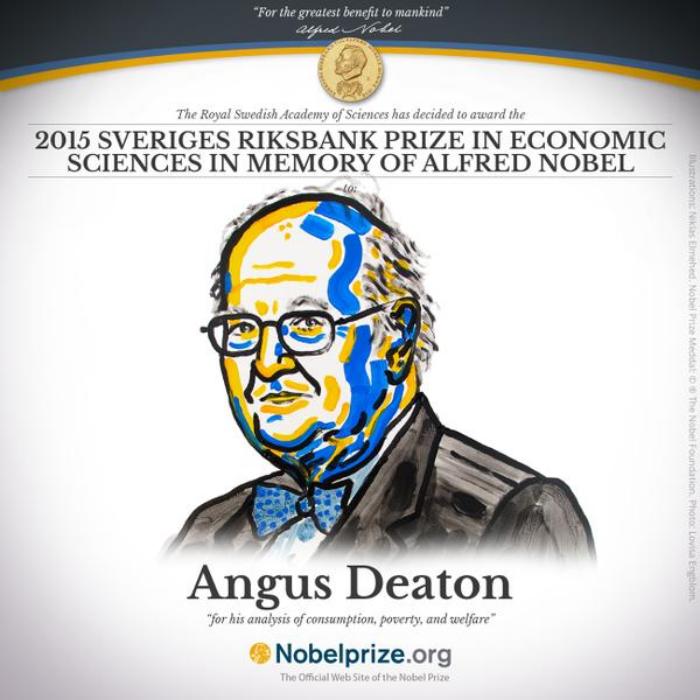
Scottish Economist Angus Deaton has been felicitated with the prestigious Nobel Prize in economic sciences for "his analysis of consumption, poverty, and welfare."
Deaton, who was born in Edinburgh in 1945, works at Princeton University in the United States. The academy said the work for which Deaton is now being honoured revolves around three central questions: How do consumers distribute their spending among different goods; how much of society's income is spent and how much is saved; and how do we best measure and analyze welfare and poverty?
Last year, French economist Jean Tirole won the 8 million Swedish kronor (about USD 975,000) award for his research on market power and regulation.
The economics award is not a Nobel Prize in the same sense as the others, which were created by Swedish industrialist Alfred Nobel in 1895.
Noted Indian development economist Jean Dreze says, "Angust Deaton is not only a brilliant economist but also a formidable scholar and a great writer. He has shown how intelligent use of survey data can illuminate momentous issues of human welfare and contribute to public reasoning."
"Deaton's work has important implications not only for the substance of economic policy in India, but also for the process of policy-making," says Dreze.
"On the substance, his work calls for significant rethinking of policy priorities, with much greater attention to the social sector in particular. On the process, Angus Deaton is very committed to the idea that public policy should be an outcome of democratic practice, as opposed, say, to professional expertise or randomized controlled trials."
Dreze further explains that Deaton's stress on democracy "has significant implications since the Indian government is constantly trying to insulate economic policy from public debate.".
Sweden's central bank added the economics prize in 1968 as a memorial to Nobel. The announcement concludes this year's presentations of Nobel winners.
The medicine prize went to three scientists from Japan, the US and China who discovered drugs to fight malaria and other tropical diseases. Japanese and Canadian scientists won the physics prize for discovering that tiny particles called neutrinos have mass and scientists from Sweden, the U.S. and Turkey won the chemistry prize for their research into the way cells repair damaged DNA.
Belarusian investigative journalist Svetlana Alexievich won the literature award while the peace prize went to The National Dialogue Quartet in Tunisia for its contribution to building democracy in Tunisia following the 2011 Jasmine Revolution.
The awards will be handed out on December 10, the anniversary of prize founder Alfred Nobel's death in 1896, at lavish ceremonies in Stockholm and Oslo.
Here are some Twitter reactions:
Congratulations to Angus Deaton for the @NobelPrize in Economics. Many of UPA's inclusive growth policies were based on his research
— Milind Deora (@milinddeora) October 12, 2015Honored to have been a student of Angus Deaton @Princeton and learnt from him about poverty and inequality. https://t.co/9JNFjv3XXO
— Sehar Tariq (@sehartariq) October 12, 2015Highly recommend the November 2013 episode of @EconTalker with Angus Deaton. Enjoyable.
— I Am A Love Charger (@sidin) October 12, 2015Nobel economics prizewinner Angus Deaton would have felt "personally dismembered" if Scotland voted for independence http://t.co/xU2CVEuUiR
— Graeme Wearden (@graemewearden) October 12, 2015-With inputs from PTI


![BJP's Kapil Mishra recreates Shankar Mahadevan’s ‘Breathless’ song to highlight Delhi pollution [WATCH] BJP's Kapil Mishra recreates Shankar Mahadevan’s ‘Breathless’ song to highlight Delhi pollution [WATCH]](http://images.catchnews.com/upload/2022/11/03/kapil-mishra_240884_300x172.png)

![Anupam Kher shares pictures of his toned body on 67th birthday [MUST SEE] Anupam Kher shares pictures of his toned body on 67th birthday [MUST SEE]](http://images.catchnews.com/upload/2022/03/07/Anupam_kher_231145_300x172.jpg)






